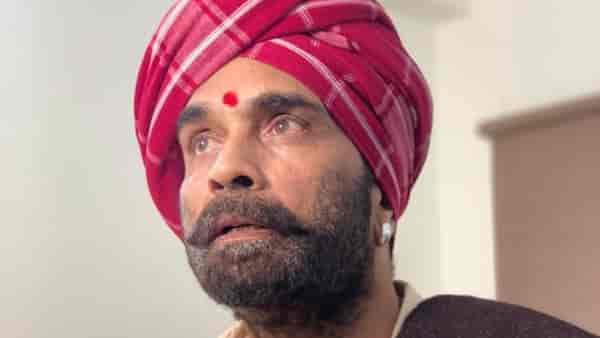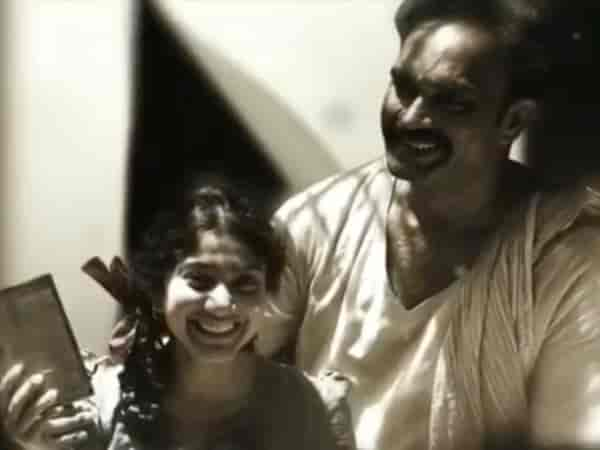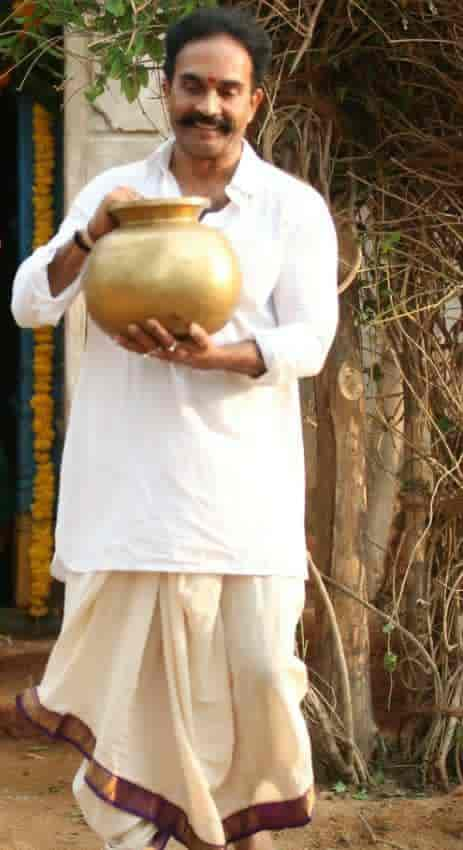Exclusive! Sai Chand: Venu Udugula has driven the essence of Virata Parvam through my character
The veteran actor, documentary filmmaker talks about his association with director Venu Udugula, playing father to Sai Pallavi again after Fidaa and why he’s still picky about his scripts

Sai Chand in Virata Parvam
Last Updated: 10.23 PM, Jun 15, 2022
One would be doing a disservice to Sai Chand if they named him just an actor. Born to legendary Telugu writer, and novelist Gopichand, Sai Chand had a passion for acting early in his life and his depth as a human, performer comes from his rich literary understanding and diverse life experiences.
Despite having a dream debut like Maa Bhoomi in 1980, he chose to be a part of films that he truly believed in and never got into the rat race. He took a U-turn from feature films in the 90s to transform into a successful documentary filmmaker, a stint that paid his bills and also satisfied his creative urge.
With Fidaa, he stormed back into the industry with greater enthusiasm, while also exhibiting the same element of caution in his choices, as in the past. Ahead of his next release, Virata Parvam, he engages in a free-wheeling chat with OTTplay.com
How crucial were the early years of your life in shaping your cinema stint?
I grew up in an environment where conversations revolved around society and social/political issues. Reading Gora Sastri early in my life had a huge impact and we were a determined lot, committed to achieving something. As a result, I was focused on whatever I did or took up in life.
My brother used to organise cultural/literary events around my father’s works - many such plays instilled a sense of purpose in my life. Most of my friend circle consisted of people like Narsing Rao, Thota Vaikuntham, who shared similar interests. All of this ultimately lead to my acting debut Maa Bhoomi.
What convinced you to take up Virata Parvam? Did you resonate with the theme better cause you hail from a family that had sharp views on politics and society?
Beyond my ancestral legacy, my Maa Bhoomi experiences convinced me to take up Virata Parvam and helped me perform better. When the director Venu Udugula told me that the film was inspired by the life of a real woman and select incidents from the naxal movement in the 90s, I was very moved. I knew it would be a very different film.
I’ve known Venu for a little more than two decades and we worked together extensively on many documentaries. He’s like my younger brother and is very committed to his responsibilities. Whenever Venu takes up something, he is obsessed with it and forgets the world around him. Even when he writes a script, he captures the minute details of the world so beautifully. He gave me a very detailed narration for Virata Parvam; I was immediately inspired to say yes.
There were two reasons for me to do the film. I have never played the role of a folk singer before and I couldn’t miss out on working with Sai Pallavi again. Venu Udugula and Sai Pallavi are the lifelines of the film, I am sure it’ll bring them a lot of laurels on a national level.

This is the second time that you and Sai Pallavi play father-daughter in a film after Fidaa. How different is your equation in Virata Parvam?
Fidaa was a tale about a sophisticated father and an educated daughter. Vennela’s education isn’t a priority here while I play a folk artiste. Though both films belong to rural backdrops and we may play father-daughter, there’s a lot of contrast between the two films. The body language and gestures will vary but the warmth between us remains the same. I went the extra mile to give a distinct touch to the portrayal because I am very aware of village life in Telangana. Maa Bhoomi took me to the heartland of the region and I have a good understanding of the villager's lifestyles, more so with the Golla community; I put it to good use here.
Having observed Sai Pallavi since the early days of her career, what do you think explains her growth and evolution as a performer?
My equation with Sai Pallavi hasn’t changed one bit since the first day we shot for Fidaa. I still address her as my daughter and I feel she’s a born actress. For instance, in Premam, she was just 21-22 and look at how she performed without any prior acting experience. Even the way she dances, you can’t take your eyes off her when she’s on the screen and has a magnetic presence; these things can’t be taught. She becomes one with the role effortlessly, does a lot of groundwork for it and having seen the industry in and out in these many decades, I can tell you such talents are rare to find.
How challenging is it to be a part of a film inspired by a real-life character? Did it involve a lot of homework?
Virata Parvam is only inspired by the incidents in the life of a true character but it isn’t her biopic altogether. So, I wasn’t given any reference to play my role and I had a free hand to bring it to life with my experiences, imagining what it means to be in the shoes of a father who has a bold, courageous daughter. The father is a source of inspiration for Vennela; he has a philosophy of life that captures her imagination. Artist Laxman Aelay helped me design my look for the film.
Most people associated with Venu call him a poet first and a director next. How has this literary touch helped in the film?
Venu is a good poet and writer. He’s a people’s poet. He told me that he was driving the essence of the film through my character. Poetry is integral to the theme of the film and that I was a folk singer in it helped him convey his intent more organically.

Returning to films and adapting to the ways of the industry after a two-and-a-half decade sabbatical is not easy at all. What are your observations on modern-day filmmakers?
In Fidaa, even though Sekhar Kammula is an experienced director, he treated me with reverence because I was more senior to him. People like him, Ram Gopal Varma (during Shiva) have told me that Maa Bhoomi was a key inspiration for them to enter the industry. They were very fond of me.
Filmmakers back then spent a lot of time as assistant directors before they directed their own films. They took up direction only when they felt they knew everything. This generation has greater exposure to the world, film schools, and access to a lot of material. Their observational skills and good scripting sense are enough to make a good film. I think the trend began with Ram Gopal Varma.
In the previous generation, the writer and director for a film were different but most modern-day directors write their own stories - even Buchi Babu Sana for Uppena made sure he got every detail of the film right. Being a fit man myself, I asked him if I had to change my physique for the film. He told me not to alter it and told me that fishermen, after their frenetic day-to-day activity, are bound to be fit people after all. I was baffled by his attention to detail.
How has the documentary filmmaker in you shaped the actor in you?
I always liked documentaries since my childhood. Though I started making them at a later phase of my life, I had a taste for them since my younger years and never missed any screenings in the city. Being a theatre person, I simultaneously had a liking for acting.
Post my documentary-filmmaking stint and returning to cinema with Fidaa, I realised I was a person with life experiences aplenty. Sekhar Kammula gave me a progressive, liberal father character to play. When I was listening to the script, I knew that I had to give my on-screen daughters the love and the tenderness they would’ve missed from their mother.
Associating with people in different capacities, interacting with them, and travelling across the globe would’ve made all the difference. The maturity in my portrayal in Fidaa came to the fore subconsciously. Even filmmaker Narsing Rao told me that only a person who understood life in great depth could’ve played it with such maturity. The same continued with films like Uppena and Check too.
Most film celebs truly believe in making hay while the sun shines and even after Fidaa, you’ve been very reluctant and picky with your choices.
Even though my grandfather was a barrister who studied in England, he didn’t practice it as much in India and was instead part of a lot of civilian movements. My dad too never got into commercial literature and came up with works that were meaningful and defied trends. When Maa Bhoomi was successful, I made it a point to be choosy and wanted to associate with films and documentaries that struck a chord with me. When I decided that I didn’t want to marry, neither was there any hurry or pressure to earn a livelihood.
I would’ve rejected at least 50-60 father roles after Fidaa. What would I get by playing the same role time and again? What satisfaction would it give me? Money is never an issue because my documentaries pay my bills and take good care of my livelihood. I prefer to remain that way and will pick roles only when I believe I could add value to them. When someone as young as Sai Pallavi is picking roles with such restraint and caution despite having every opportunity to make easy money, why should I think otherwise?
Maa Bhoomi completed four decades of release recently. What explains its relevance even today?
The sincerity in filmmaking is the sole reason I can think of. The entire team was in sync with one another’s thoughts. Everyone was working in the same direction. Who would want to go to a village where there’s no electricity just because they need to recreate the 1940s era? I am not sure if any team has willingly experienced so much difficulty just to make a good film. Ultimately, the honesty with which you approach your work gives it a timeless quality. Why do you think my father’s Asamardhuni Jeevayathra is still relevant even after 75 years? I believe Fidaa too has the legs to stay in the hearts of the people for many more decades.

 Premium
Premium